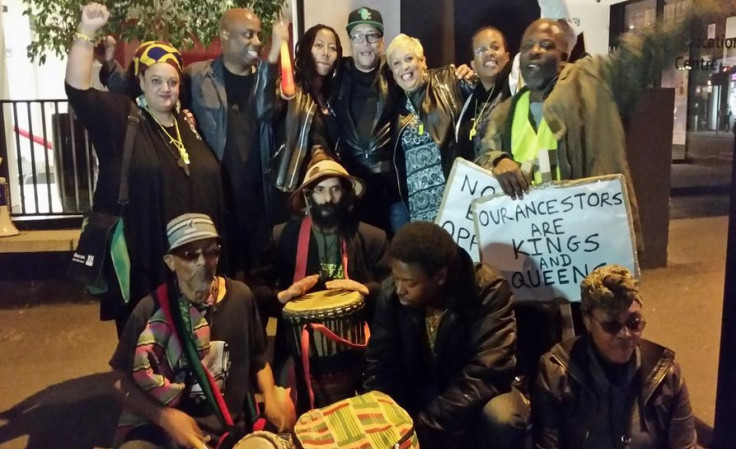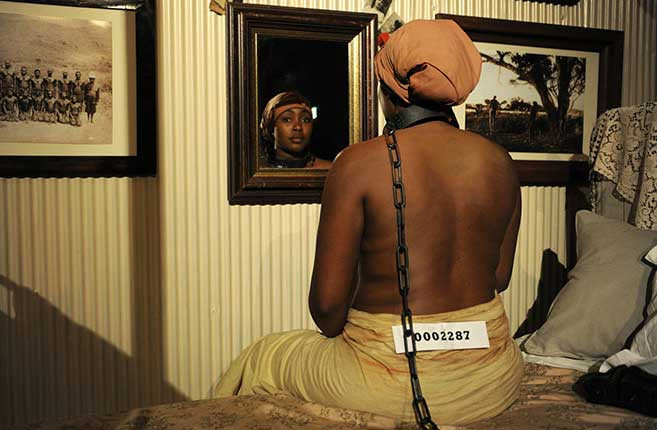Barbican 'Disturbed' by Human Zoo Racism Protesters Following Exhibition Cancellation

The Barbican has said it is "profoundly troubling" they were forced to cancel an anti-slavery exhibition because of protests and accusations of racism.
The London gallery withdrew a presentation of Brett Bailey's 'Exhibit B - The Human Zoo' following complaints and protests outside the venue on the opening night.
The Barbican said the demonstration made it impossible for any further showings to take place and the protesters' "triumphant" actions resulting in the cancellation of the exhibit amounted to censorship of free speech.
The installation featured live models posing as black slaves in shackles and cages reminiscent of the 'human zoo' seen in Europe as a result of 19th century colonialism. It was accused of being an act of "complicit racism" which failed in its intentions of shining a light on the "horrors" of the past.
An online petition calling for the show to be cancelled received more than 20,000 signatures, with protest campaign group Boycott Human Zoo gaining nearly 2,000 members.
Sara Myers, who started the petition, said: "If Brett Bailey is trying to make a point about slavery this is not the way to do it. The irony gets lost and it's not long before the people behind the cage begin to feel like animals trapped in a zoo. One of the actors in his piece said: 'How do you know we are not entertaining people the same way the human zoos did?'"

Bailey's exhibition was due to be shown at the Barbican for five days, but all performances were cancelled after around 200 people protested outside the venue with placards.
The Barbican dismissed suggestions that Exhibit B is racist and instead said it turned the "notion of exotic spectacle on its head". The gallery also said it held discussions about the issues raised by the exhibit with those who showed an objection to it.
The venue said it cancelled the show's opening night due to the "extreme nature of the protest and the serious threat to the safety of performers, audiences and staff". Police were called to the scene as the demonstration started, but no arrests were made.
A barbican spokesperson said: "We find it profoundly troubling that such methods have been used to silence artists and performers and that audiences have been denied the opportunity to see this important work. Exhibit B raises, in a serious and responsible manner, issues about racism; it has previously been shown in 12 cities, involved 150 performers and been seen by around 25,000 people with the responses from participants, audiences and critics alike being overwhelmingly positive.
"The Barbican has done everything we can to ensure London performances can go ahead – including continued dialogue with protestors and senior Barbican staff meeting with the leaders of the campaign and attending a public meeting to discuss the issues raised by the work. We respect people's right to protest but are disappointed that this was not done in a peaceful way as had been previously promised by campaigners.
"We believe this piece should be shown in London and are disturbed at the potential implications this silencing of artists and performers has for freedom of expression."

Exhibit B has already been staged across Europe to mainly positive reception, including a five-star review in The Guardian which described Bailey's work as "both unbearable and essential" when it was shown at the Edinburgh International Festival.
Before the protests took place, the actors taking part in the exhibition also defended its intentions. They said in a joint statement: "We find this piece to be a powerful tool in the fight against racism. Individually, we chose to do this piece because art impacts people on a deeper emotional level that can spark change.
"The exhibit does not allow for any member of the audience – white, black or otherwise – to disassociate themselves from a system that contains racism within it. We are proud to be black performers in this piece; to represent our history, our present and ourselves by playing the various characters taken from the record books."
© Copyright IBTimes 2025. All rights reserved.





















